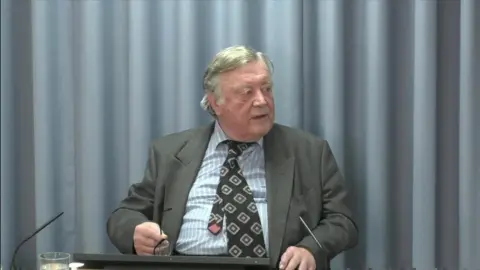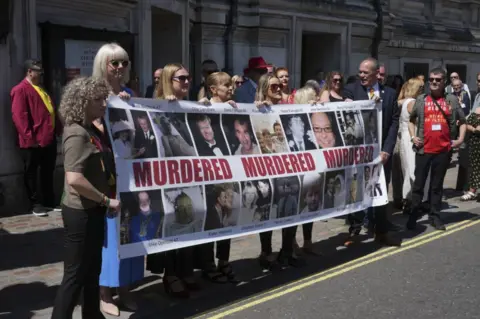Clarke faces questions over blood scandal - minister
 BBC
BBCFormer health secretary Lord Ken Clarke has been criticised for his handling of the contaminated blood scandal by a Conservative colleague.
Work and Pensions Secretary Mel Stride said Lord Clarke needed to answer "very serious questions" over his involvement in the 1980s.
Mr Stride's criticism comes after the final report of the Infected Blood Inquiry accused Lord Clarke of "misleading" the public and rebuked him for his "combative style" when he gave oral evidence to the probe.
Lord Clarke has been contacted by the BBC for comment about the scandal, which saw 30,000 people infected with HIV and hepatitis between 1970 and 1991.
Campaigners have demanded an apology from the veteran Conservative, who was health secretary from 1988 to 1990, amid calls for him to lose his peerage.
Asked if he feels Lord Clarke has questions to answer, Mr Stride told Sky News: "There are clearly questions that are being posed, very serious questions, and to that degree indeed there are questions that need to be addressed."
He also said stripping Lord Clarke of his peerage is a matter for the relevant committee.
Mr Stride told the broadcaster: "I think some have been calling for his knighthood to be removed. That's a matter for the forfeiture committee, not for Government or me really, I think, to opine on that level."
He added many groups of people had "come out of this report very badly".
Others criticised in the report include former prime ministers Margaret Thatcher and Sir John Major, as well as haemophiliac specialist Prof Arthur Bloom and the NHS.
The chairman of The Haemophilia Society, Clive Smith, told LBC Radio on Tuesday that Lord Clarke had given evidence which was "breathtaking in the extreme".
Mr Smith, who is a barrister, said the former health secretary should apologise for his "lack of humanity and compassion" at the inquiry, as well as his involvement at the time.
The society had written a letter to the House of Lords when it was suggested that Lord Clarke was going to get a peerage, asking officials to wait until the inquiry had finished.
He said: "Now we have the conclusions of the Infected Blood Inquiry report, I think our letter was well-timed and entirely accurate.
"The way in which he gave his evidence (to the inquiry) was appalling."
Back in 1983, a statement from Lord Clarke was published in an Aids leaflet and a press release, that said: "It has been suggested that Aids may be transmitted in blood or blood products. There is no conclusive proof that this is so."
The inquiry heard how that statement was repeated over several years, despite the Department of Health understanding that it was "likely" that Aids was transmitted through blood and blood products.
Defending this in 2021, Lord Clarke told the inquiry: “The ‘no conclusive proof’ phrase – these three words are taken out as though they are loaded with significance.
"The term ‘no conclusive proof’ is a perfectly accurate description of the then-medical opinion."
 PA Media
PA MediaHowever, inquiry chairman Sir Brian Langstaff said ministers should have challenged the 'no conclusive proof' line.
He said: "This line to take, whilst technically correct, was indefensible.
"It did not spell out the real risk. It gave false reassurance.
"It lacked candour and, by not telling the whole truth, was misleading."
In the 1980s, the government decided against any form of compensation to people infected with HIV, with then-health minister Lord Clarke saying there would be no state scheme to compensate those suffering "the unavoidable adverse effects" of medical procedures.
Prime Minister Rishi Sunak's official spokesman said individuals named in the inquiry should respond on their own behalf.
He said: "When it comes to individuals and groups who are named in the report, the report is obviously incredibly wide-ranging and names a number of groups and individuals.
"It will be up to individuals to respond rather than me.
"We will obviously, from our part, be taking forward the recommendations both on compensation and looking at the wider recommendations meticulously and responding as soon as possible."
